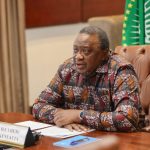Nyeri County has adopted solar energy as part of its strategy to mitigate the adverse effects of climate change.
The initiative, spearheaded by the Department of Climate Change under the Financing Locally-Led Climate Action (FLLoCA) program, has led to the construction of two solar driers at Chorongi and Thageini Coffee Factories.
These driers are expected to cut coffee cherry bean drying time by half, significantly reduce labour costs and boost farmers’ profits.
Governor Mutahi Kahiga, while addressing the Nyeri County Assembly during his State of the County address said the technology marks a transformation in coffee processing by reducing reliance on natural sunlight and electricity.
“Through FLLoCA, two solar driers have been constructed at the Chorongi and Thageini Coffee Factories. The driers will reduce drying time by 50 per cent while maintaining quality, reducing labour costs, and ultimately increasing farmer incomes,” said Kahiga.
Additionally, the FLLoCA program has supported water accessibility projects across the county. These include constructing a water intake for the Gatei Water Project in Magutu Ward and rehabilitating seven boreholes in Rongai, Kimahuri, Warazo Jet (Kieni East), Mahiga, Karera, Treffos (Kieni West), and Ndimaini (Mathira East).
These projects are set to improve water supply and support small-scale irrigation.
FLLoCA, a five-year program funded by the Government of Kenya, the World Bank and other partners, aims to promote locally-led climate resilience and build capacity to manage climate risks at the county and national levels.
Nyeri County has invested over Ksh 100 million in climate-friendly projects, including planting over five million tree seedlings as part of its efforts to combat climate change.
A portion of the funds has been used to distribute assorted fruit seedlings to farmers to enhance food security as a long-term solution.
The solar drier project aligns with the National Climate Change Act of 2016, which mandates counties to integrate climate action into development plans.
In July, Nyeri County Climate Change Director Yvonne Mathenge announced plans to expand the project to additional coffee factories.
“We had a budget to install three or four solar driers and have already done two. We are preparing to do another one or two more in other areas. It’s one of the priority actions we are taking in climate action and optimization of production in agriculture and manufacturing,” Mathenge said.
Solar driers offer a significant advantage over traditional drying methods, as they are unaffected by weather changes or power blackouts, ensuring uninterrupted coffee processing.
Governor Kahiga has also encouraged residents to increase tree cover on their land to combat worsening climatic conditions and counter deforestation.
Through partnerships with the Upper Tana Nairobi Water Fund Trust and the Kenya Forest Service, Nyeri County planted over 2 million trees in the last financial year.
“In adherence to Article 42 of the Constitution of Kenya 2010, the Department of Environment has made significant progress in environmental conservation. Over 40,000 assorted tree species and 17,017 fruit tree seedlings were distributed and planted by institutions and community groups,” Governor Kahiga noted.
Nyeri County leads the nation in forest cover at 40.8 per cent, compared to Kenya’s national average of 8.83 per cent.
Kenya has embarked on an ambitious campaign to plant 15 billion trees by 2032, aiming to reduce greenhouse gas emissions and reverse deforestation.
The United Nations Convention to Combat Desertification warns that 40 per cent of the planet’s land is degraded, affecting half the global population. Without urgent action, droughts could impact over 75 per cent of the world’s population by 2050.
Nyeri County’s initiatives, including solar energy adoption, water accessibility projects, and massive tree-planting drives, reflect a proactive approach to safeguarding the environment and building climate resilience for future generations.











